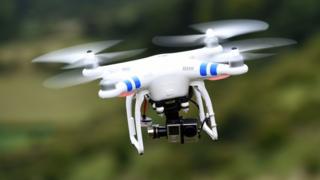Proposals for drones to fly at night and over crowds in US
 Image copyright
Image copyright
PA
Drones in the US may soon fly over populated areas and at night, under proposals from the Federal Aviation Administration (FAA).
The US government is keen to extend the use of such craft for commercial purposes.
That is in stark contrast to the UK, which plans to make tougher laws.
It follows recent disruption at two major UK airports, where suspected drone activity caused aircraft to be grounded.
Both Google-parent Alphabet and Amazon are considering drone delivery services, while Californian start-up Zipline, which currently operates commercial drones in Rwanda, is also looking into the possibility of using unmanned aerial vehicles for rural healthcare services in the US.
US Transportation Secretary Elaine Chao, who is considering the FAA proposals, said she was “keenly aware” of safety issues.
In a speech in Washington, she said that three public-private partnerships had launched in Nevada, Virginia and North Dakota to test air-traffic management concepts for unmanned aircraft.
Injury threshold
There are nearly 1.3 million registered drones in the US and more than 116,000 operators.
Currently, operators wanting to fly drones at night have to apply for a waiver.
In 2017, the FAA granted 1,233 such waivers, with no reports of any accidents.
Under the proposed US laws, drones under a certain weight would no longer require a waiver although any devices flying at night would have to be fitted with “anti-collision lights” that can be seen up to three miles away and operators would need enhanced training.
The FAA proposes creating different rules for drones of varying weights.
Drones weighing 0.25kg (0.55lb) or less would be able to fly over populated areas without any additional restrictions but heavier craft would have to be able to demonstrate that if the drone crashed into a person, the resulting injury would be “below a certain severity threshold”.
Robert Garbett, chief executive at the Drone Major Group consultancy, said: “The commercial air drone market is currently still like the Wild West… exciting, and representing unprecedented economic opportunity for companies and organisations which are fast adopting this exceptional technology.
“However, there will always be those who would flout laws and regulation to cause maximum disruption around the world.
“This particularly impacts on more vulnerable sectors such as airports, financial centres, energy facilities, stadiums and concert venues which require tailored defence strategies to protect against what is a new and real security challenge.”
Chilling effect
In Canada, new laws have recently been announced requiring anyone flying a drone of a certain size to pass an online exam, with drones required to fly below 400ft (122m).
The UK has also announced its intention to extend regulations around drone use, with a consultation published earlier this month which proposes to:
- give police additional powers to land, seize and search drones
- expand the technology in place at airports and prisons to repel rogue drones
- extend exclusion zones around airports
- require drone operators to register and pass an online safety test
Ryan Jenkins, policy director at WhiteFox Defense Technologies, a US-based drone security company, said: “The greatest worry is that these requirements will serve as a chilling effect on drone use, undermining the creative and responsible innovation that will lead to new, beneficial uses of drones.
“Each obstacle the government erects in front of a potential user – registration, fees, pre-flight notifications, et cetera – reduces the number of people we can expect to use the technology, and delays the benefits that might follow.”


